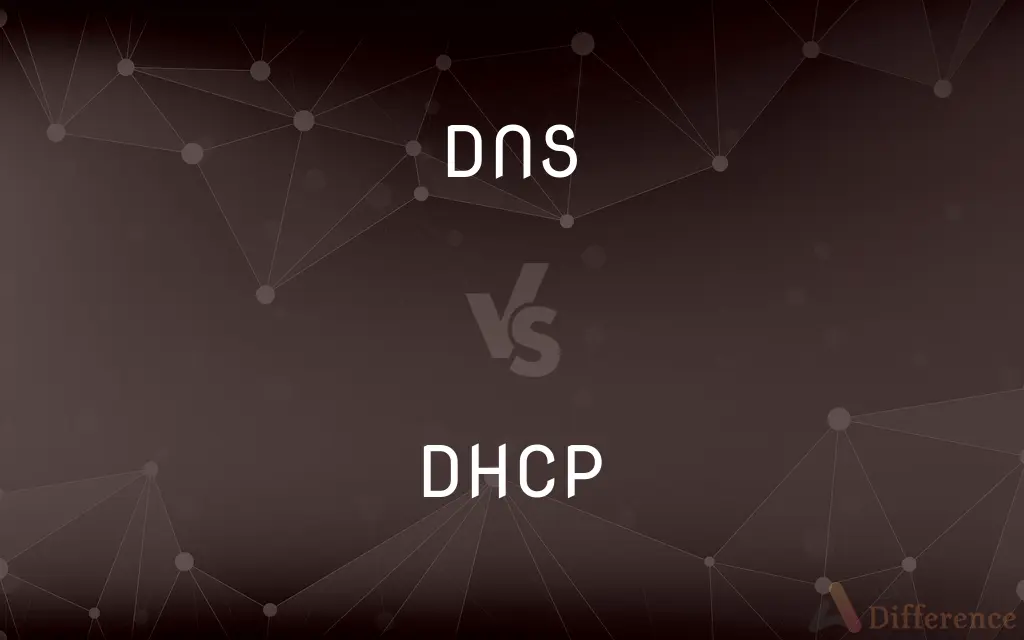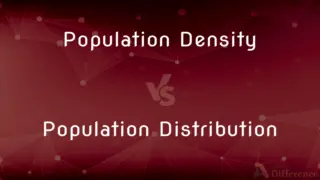DNS vs. DHCP — What's the Difference?
By Tayyaba Rehman — Published on November 19, 2023
DNS translates domain names to IP addresses; DHCP assigns IP addresses to devices on a network.

Difference Between DNS and DHCP
Table of Contents
ADVERTISEMENT
Key Differences
Within the intricate tapestry of network management, DNS and DHCP emerge as distinct, yet synergistically operating entities. DNS, or Domain Name System, is essentially a digital translator, converting user-friendly domain names to IP addresses, facilitating efficient internet navigation. Conversely, DHCP, which stands for Dynamic Host Configuration Protocol, operates as an IP manager, dynamically assigning IP addresses to devices within a network, ensuring seamless connectivity and communication among devices.
The indispensable nature of DNS becomes starkly apparent when considering the gargantuan web of IP addresses it deciphers, guiding users adeptly to their online destinations. On the other hand, DHCP serves as the subtle maestro orchestrating device connectivity within a network, assigning, managing, and recycling IP addresses, ensuring each device can communicate effectively on the local network, without IP conflict, by providing unique IPs to each device for a specified duration.
From a cybersecurity lens, DNS and DHCP, while distinct in function, both pose potential vulnerabilities if not safeguarded adequately. DNS, through its translation service, could be exploited via DNS spoofing, misguiding users to fraudulent websites. DHCP, while crucial for network harmony, can be vulnerable to attacks like DHCP spoofing, where unauthorized devices may be granted network access, highlighting the need for secure DHCP configuration.
A dive into the user experience demonstrates that DNS subtly underpins a substantial portion of user interactions online, translating typed URLs into navigable IP addresses, enabling users to reach desired web destinations without memorizing numerical IPs. Whereas DHCP operates predominantly behind the scenes from a user’s perspective, yet its seamless IP management ensures that devices can connect and communicate effectively within networks without user intervention in IP configurations.
Exploring the operational mechanics unveils DNS as an essential internet component, deploying a hierarchical structure to systematically translate domain names into their corresponding IP addresses, navigating users to desired web locations. DHCP, operationalizing within networks, deploys a systematic methodology to dynamically allocate IP addresses to devices, ensuring efficient, conflict-free network communication and conserving IP address usage by leasing them to devices for specific durations.
ADVERTISEMENT
Comparison Chart
XPrimary Function
Translate domain names to IP addresses
Dynamically assign IP addresses to network devices
Role in Networking
Facilitate web navigation
Manage IP allocation within a network
User Interaction
Indirect (through browsing)
Minimal, operates behind the scenes
Security Concerns
DNS Spoofing, Cache Poisoning
DHCP Spoofing, Unauthorized DHCP servers
Hierarchical Structure
Yes, operates with a structured hierarchy
No, functions within local networks
Compare with Definitions
DNS
Domain Manager
DNS organizes and resolves domain names, ensuring each IP address corresponds to a domain.
DHCP
Network Conductor
DHCP efficiently manages IP assignment within a network, ensuring seamless communication.
DNS
Digital Translator
DNS converts human-readable URLs to numerical IP addresses for web navigation.
DHCP
Communication Enabler
DHCP enables devices to communicate within a network by managing their IP configurations.
DNS
Hierarchical Structurer
DNS employs a hierarchical system to manage and resolve domain names to IP addresses.
DHCP
Dynamic Allocator
DHCP dynamically assigns IP addresses to devices, ensuring unique IPs within a network.
DNS
Internet Facilitator
DNS ensures users can navigate the internet without memorizing numerical IP addresses.
DHCP
Device Connector
Through DHCP, devices within a network receive IP addresses enabling network communication.
DNS
Web Navigator
DNS helps users reach websites by translating domain names to IP addresses.
DHCP
IP Manager
DHCP oversees IP address allocation, expiration, and reassignment in networked environments.
Common Curiosities
Can DNS and DHCP function together?
Yes, DNS and DHCP often work together to manage domain resolution and IP address allocation in networks.
Why is DHCP crucial in a network?
DHCP ensures each device has a unique IP address, preventing conflicts and enabling communication.
What does DNS do?
DNS translates domain names to numerical IP addresses, facilitating internet navigation.
How does DNS assist in web browsing?
DNS translates the URLs entered into a browser to IP addresses, directing users to the correct web location.
Can a network function without DNS?
Yes, but users would need to navigate the web using numerical IP addresses instead of user-friendly domain names.
How does DHCP assist in networking?
DHCP dynamically assigns IP addresses to devices in a network, enabling smooth communication.
How is DHCP related to IP addresses?
DHCP manages the dynamic allocation, renewal, and recycling of IP addresses within a network.
What is a DNS query?
A DNS query is a request sent to a DNS server to resolve a domain name into an IP address.
What is DNS hierarchy?
DNS hierarchy is a structured approach to manage domain name resolution in a scalable and distributed manner.
What happens without DHCP?
Without DHCP, network administrators might need to assign IP addresses manually, a complex and error-prone task.
Can DNS resolve to multiple IP addresses?
Yes, DNS can resolve a domain to multiple IPs, facilitating load balancing and redundancy.
Does DHCP only manage IP addresses?
Primarily yes, but DHCP also manages other network configurations like DNS servers and subnet masks.
How does DHCP determine which IP to assign?
DHCP assigns IPs based on availability in its pool, ensuring no IP conflict within the lease duration.
Is DNS secure?
While DNS is robust, it can be exploited (e.g., DNS spoofing) and thus should be secured, for example, via DNSSEC.
Can DHCP pose security risks?
Yes, without proper safeguards, DHCP can be vulnerable to attacks like DHCP spoofing.
Share Your Discovery

Previous Comparison
Catalytic Cracking vs. Hydrocracking
Next Comparison
Population Density vs. Population DistributionAuthor Spotlight
Written by
Tayyaba RehmanTayyaba Rehman is a distinguished writer, currently serving as a primary contributor to askdifference.com. As a researcher in semantics and etymology, Tayyaba's passion for the complexity of languages and their distinctions has found a perfect home on the platform. Tayyaba delves into the intricacies of language, distinguishing between commonly confused words and phrases, thereby providing clarity for readers worldwide.












































